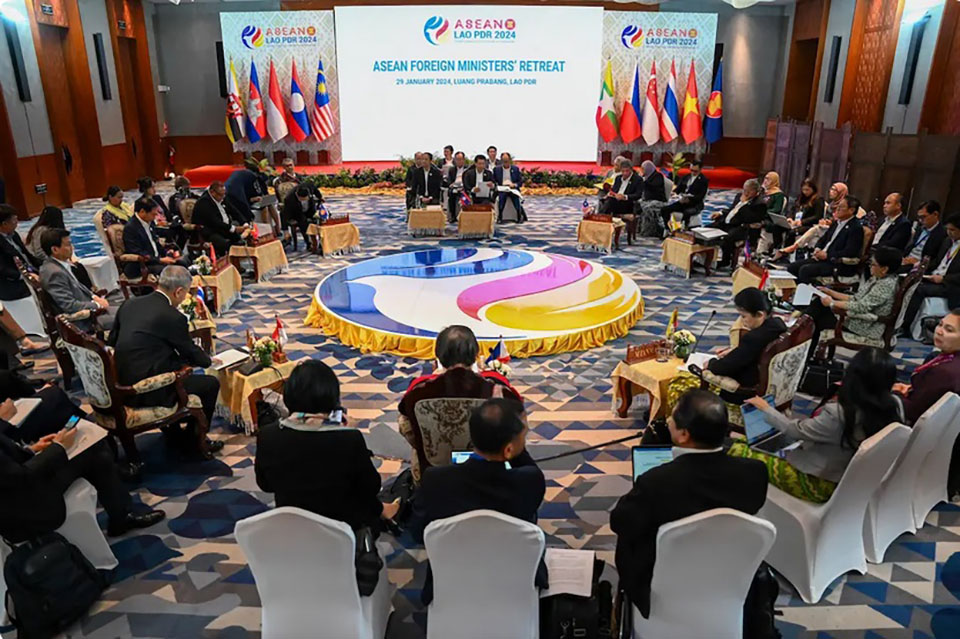
ASEAN and China will intensify negotiations on a Code of Conduct (COC) for the South China Sea this year as Laos hopes to have a third reading of COC with China “as soon as possible.”
Laos Foreign Minister Saleumxay Kommasith said that after chairing the ASEAN Foreign Ministers Retreat meeting (AMM Retreat) in Luang Prabang on Jan 29. “That would create an environment where both ASEAN members, especially the claimant states, and China can build more trust and confidence,” he emphasized.
ASEAN and China have been trying for years to hammer out a COC. The code is intended to reduce the risk of conflict in the South China Sea in the disputed areas where China’s “nine-dash line” maritime claim clashes with those of the Philippines, Vietnam, Malaysia, and Brunei. Indonesia has also expressed concern about what it sees as Beijing’s aggressive encroachment on its exclusive economic zone.
In 2023, despite ongoing conflicts in Ukraine and the Middle East, the South China Sea hotspot continued to grab international attention with new developments on the ground. The so-called “grey zone” activities were more commonly observed. Most notably, there were some incidents between China and ASEAN member states, especially the Philippines in Spratly Islands.
Philippines President Marcos Jr. spoke about China’s continuous building of military bases in the disputed territories, saying “The situation has become direr than it was before”. Many worry these increasingly tense hostilities could escalate into a broader conflict.
In that context, the COC negotiation process needs to speed up more than ever to help manage these maritime and territorial disputes in the South China Sea.
Last July, ASEAN and China adopted Guidelines for accelerating the early conclusion of an effective and substantive COC. The guidelines reflect efforts by ASEAN member states to inject new momentum into talks.
China also welcomed the successful completion of the second reading and is ready to accelerate the process at the 21st ASEAN-China Senior Officials Meeting on the Implementation of the DOC (SOM-DOC) on October 26, the two sides announced the official launch of the third reading to sign the COC soon.
After the first ministerial meeting to kick off the Lao PDR’s Chairmanship of ASEAN 2024, Laos Foreign Minister Saleumxay expressed his optimism that progress could be made this year on the COC negotiation process.
He also said several ASEAN nations brought up the tensions in the South China Sea in the meeting. “Whatever happens in the South China Sea should be resolved in a peaceful manner through dialogue and consultations”, Saleumxay said and stressed all sides with claims in the South China Sea need to respect the United Nations Convention on the Law of the Sea (UNCLOS-1982).
According to the statement issued by Laos Foreign Ministry after AMM Retreat, ASEAN Foreign Ministers “welcomed the progress achieved so far in the ongoing negotiations on the COC” and “looked forward to the early conclusion of an effective and substantive COC that is in accordance with international law, including the UNCLOS-1982”.
The Group also emphasized the need to maintain and promote an environment conducive to the COC negotiations and thus welcomed practical measures and cooperation initiatives that could promote trust and confidence, reduce tension and the risk of accidents, and avoid misunderstandings and miscalculations.
It remains to be seen how fast the COC process could progress and how effectively the new document could restrain the actions of claimant parties. Many regional experts and scholars said that the COC negotiation is essentially a process in which all parties gradually enhance mutual trust through the accumulation of consensus, and only when this process is kept running well can a truly effective COC be reached.
To promote the negotiation to achieve more results as soon as possible, ASEAN countries and China still need to achieve more a consensus on certain issues.








